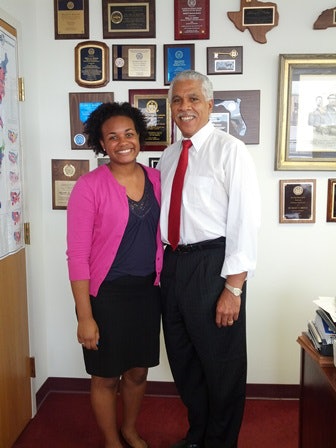 Mikaela Ferrill, the vice president of the Georgetown University NAACP chapter with Hilary Shelton, the bureau chief of the D.C office of the NAACP.
Mikaela Ferrill, the vice president of the Georgetown University NAACP chapter with Hilary Shelton, the bureau chief of the D.C office of the NAACP.WASHINGTON, D.C.—For as long as she can remember, Georgetown University junior Mikaela Ferrill has been an active member of the National Association for the Advancement of Colored People (NAACP).
Ferrill, 20, of Milwaukee, Wisconsin, attended her first NAACP meeting with her mother when she was a child and eventually got active in the youth council of the nation’s oldest civil rights organization that was founded in 1909 by Dr. W.E.B Du Bois, Ida B. Wells and others.
When it was time for her to apply to college, she insisted on attending a university that had an active NAACP chapter. “I have a bias when it comes to the NAACP,” says Ferrill, who recently completed an internship in the D.C. office of the Baltimore-based organization under the direction of Hilary Shelton, a longtime NAACP staffer. “What we do and will continue to do in this country is really important.”
At a time when many have consistently argued that the message of the old guard civil rights groups no longer resonate with young people of this generation, the surge among NAACP college chapters across the country tell another story.
The due-paying memberships in the nearly 300 college chapters of the NAACP have doubled over the last five years. The upswing in participation among student leaders is likely a direct result of the organization’s aggressive efforts to target college students and its decision in 2008 to appoint Benjamin Todd Jealous as the president and chief executive officer of the organization—the youngest person to lead the 104-year-old group.
At the time, the 35-year-old Jealous, a former Columbia University student organizer and Rhodes scholar, was viewed as the answer to an aging membership, but last month he announced that he was stepping down after five years on the job, to spend more time with his family.
The organization has since announced that Lorraine Miller, who served as the first African American clerk (and the first African American officer) of the U.S House of Representatives from 2007 to 2011, and who has worked for former House Speakers Nancy Pelosi, Tom Foley and Jim Wright, as well as U.S. Rep. John Lewis, would step in as interim director of the NAACP until a permanent replacement for Jealous is found.
A veteran Washington insider, Miller has also worked as Bureau Chief at the Federal Communications Commission during President Clinton’s time in the oval office and served as Director of Congressional Relations for the Federal Trade Commission.
“This is a moment of great change and great opportunity for the NAACP,” says the organization’s chairman Roslyn M. Brock, who became active in the NAACP in 1984, while a freshman at Virginia Union University and was named a Youth Board member the following year. She worked her way through the ranks of the organization and later wrote her master’s thesis on the NAACP’s Heath Outreach Program.
Still, the absence of Jealous will likely be felt hardest among the college-age demographics, many of whom were won over by his youthfulness and his views on progressive issues like same-sex marriage.
“I think President Jealous has done a great job,” says Ferrill, 20, who is vice president of Georgetown’s NAACP chapter Last year, Jealous accepted her invitation to speak on campus to a packed auditorium.
Veteran civil rights leader Julian Bond who served as chairman of the NAACP from 1998 until 2010, says that it is critical that whoever leads the organization has to build upon Jealous’ work and continue to reach out to young activists.
“We will not be looking for a young person particularly, but rather someone who can duplicate Ben Jealous’ ability to raise resources, which was prodigious; someone who can keep the organization strong, someone who is familiar with the civil rights community and who can work with our coalition partners, who is comfortable with people of all sorts – and if he or she is young, that’s an extra benefit,” says Bond.
Across the country, NAACP college chapters led the mobilization around the shooting death of 17-year-old Trayvon Martin and protested voter disenfranchisement laws and aggressively called for an end to New York City’s controversial Stop-and-Frisk police policies.
“They are engaged in a very new and exciting way,” says Sammie Dow, who is national director of the organization’s Youth and College Division. He pointed out that during the recent debates surrounding gun violence and the Affordable Health Care Act, NAACP college chapters members helped to drive the discussions on social media.
College chapters of the NAACP have long played an important role in agitating for social change. During the 1980s, for example, they led the charge to divest in apartheid South Africa, and rigorously campaigned for Reverend Jesse Jackson’s 1984 and 1988 presidential campaigns.
Unlike other organizations, Bond says that young people have always played an important role in the NAACP.
“I believe we have more youth members in the NAACP than does any civil rights organization that has both youth and adult members,” he says. “The idea that the NAACP is an organization of older people only is nonsense.”
Other civil rights groups say that as the 2014 mid-term elections approach, they too are mobilizing on college campuses.
National Action Network, the Harlem-based civil rights group started in 1991 by the Reverend Al Sharpton is in the final stages of rolling out college chapters which will be coordinated by a young minister who is currently enrolled as a student at Morehouse College.
“It’s important that we get college students mobilized around civil rights issues and voter registration,” says Sharpton, who like Jealous and Bond, is a popular speaker on college campuses. “They’re going to help make the difference.”


















